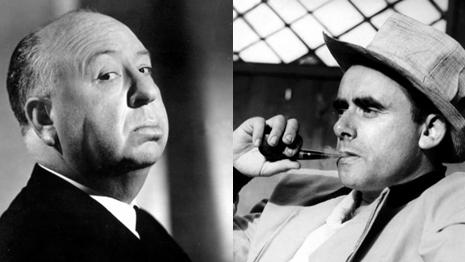Is It Just Me... Or Was Hitchcock Number Two In His Field?
Henri-Georges Clouzot was a superior filmmaker

Nothing really went right for Henri-Georges Clouzot.
Dogged by ill health, branded a Nazi collaborator and spurned by the French New Wave, his career was largely one of wasted opportunity and unrealised potential.
Somehow, though, he still made a trio of remarkable thrillers – Le Corbeau , The Wages Of Fear and Les Diaboliques – that saw him proclaimed as Alfred Hitchcock’s main rival.
Not only that, but he also had a thing for blondes. But to my mind, calling Clouzot “the French Hitchcock” as many have done is a back-handed compliment.
Much as I love Hitch, I don’t revisit his films half as much as I do his Gallic counterpart.
Nor do I find Alfie’s playful, mischievous style half as mesmerising as HG’s chilly, austere worldview, for all the many pleasures his work affords.
Hitch was always a consummate showman, a skilful conjuror who delighted in wrong-footing his audience with sleights of directorial hand.
Clouzot, though, was something else: a baleful critic of humanity who, with his unflinching eye for amoral characters prompted by greed, lust and sadism, was keeping it psychologically real in a way Hitch either never could or politely declined to.
Yes, there’s ugliness and violence in Hitchcock’s flicks. But it’s normally perpetrated by agents outside the norm: cross-dressing psychopaths, for example, or birds gripped by an inexplicable malevolence.
In Clouzot’s great pictures, the monster isn’t out there. Instead it’s within – the avarice and desperation that compel Yves Montand to drive a truck over Charles Vanel in Wages , for instance, or the hysteria, suspicion and paranoia that a few poison-pen letters unlock in Le Corbeau .
For me, it is not the palm-sweating tension and expertly sustained atmosphere of creeping dread that make Les Diaboliques so fiendish. It’s the casual and calculated cruelty, inflicted without a shred of remorse with the basest of motivations.
I’ve yet to find anything in Hitchcock as unsettling, and that includes Raymond Burr’s creepy neighbour in Rear Window and Rebecca ’s Mrs Danvers.
OK, so Hitch has the numbers on his side: a vast, diverse oeuvre that covered half a century, two continents and the transition from silents to talkies.
Admittedly, Clouzot is a bit of a lightweight in comparison, though the overlooked likes of Manon , Quai Des Orfèvres and La Vérité do show he that was more than a three-picture pony.
Watching 2009’s fascinating documentary on his unfinished L’Enfer , you are left in no doubt it was circumstances rather than ability that curtailed his credits.
And in any case, since when was being prolific a mark of artistic merit?
Hitchcock was a genius, of that there is no doubt. Yet because his controlling hand is forever visible, we’re always just a tiny bit distanced from his brilliantly orchestrated constructions.
Clouzot doesn’t only want us to be voyeurs, though. He wants us to be participants, enduring the same gruelling emotional cocktail as his all-too-identifiable protagonists.
Hitch might be the master of suspense, but Clouzot is the more masterly storyteller. Or is it just me?
Bringing all the latest movie news, features, and reviews to your inbox
Neil Smith is a freelance film critic who has written for several publications, including Total Film. His bylines can be found at the BBC, Film 4 Independent, Uncut Magazine, SFX, Heat Magazine, Popcorn, and more.


